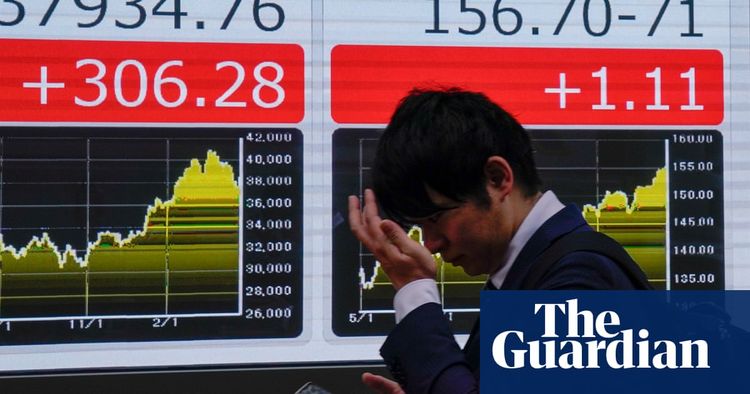Why has the yen fallen to a decade’s low and what does it mean for Japan’s economy?

The worth of Japan's money has significantly dropped and it has reached the same level as it was in 1990, right after the "bubble economy" crisis happened. At one point on Monday, it was exchanging at 160 yen for every US$1, but a few years back it was almost 100 yen for every US$1.
The yen is rapidly decreasing, which could have negative consequences for those living in Japan. A weaker yen puts household budgets under pressure by causing the cost of imported goods to rise. Due to Japan's dependence on imported food and energy, this could ultimately cause inflation to go up.
Japanese exporters benefit from a weaker yen as it increases their profits. Additionally, tourists visiting Japan can make the most out of their currencies due to the favorable exchange rate.
What Caused The Yen's Sharp Decline?
For over three years now, the yen has been consistently decreasing in value, having dropped by more than 33% since the beginning of this year.
There is a reason for the decrease in value, which is the yen's loss of momentum. This is because investors are getting rid of it, and they don't stop doing so because of its decreasing worth. As a result, the market becomes trapped in a cycle of fulfilling itself.
Due to the decrease in the value of the currency, the exporters are not motivated to exchange their foreign earnings into yen, which leads to a further reduction in the demand.
Nevertheless, the currency's significant decrease can also be attributed to key policy factors.
The Bank of Japan (BOJ) has been maintaining very low interest rates for many years with the aim of promoting inflation in the economy, increasing bank lending, and stimulating demand.
During February, Japan was faced with a large number of labor shortages and a decreasing value of its currency, resulting in it losing its position as the world's third-largest economy to Germany and going into a period of recession.
The decline of the yen was greatly influenced by the low interest rates, which led to the Bank of Japan (BOJ) changing their policies. They recently ended their policy of keeping their benchmark interest rate below zero. Instead, they increased their short-term policy rate from a negative 0.1% to a range between zero and 0.1%.
Following that choice, the financial markets were concentrating on the speed of future interest rate hikes. Last Friday, the BOJ made an announcement stating they wouldn't increase interest rates soon, preserving the current rates. This prompted the yen to drop even further, causing more financial strain on the currency.
This widespread selling spree caused the currency to drop to 160 yen against the dollar, marking its lowest point since 1990.
"What's Its Impact?"
The yen is currently valued at a historically low rate, resulting in a substantial increase in tourism for Japan. As a result of this, both the euro and Australian dollar, as well as the Chinese yuan - all of which are valuable markets for the country's tourism - have also seen a multi-year reduction in their value against the yen. Consequently, travelers' money is taking them further than it ever has before, contributing greatly to the booming industry.
Japan had a fantastic month in February, with a record 2.79 million visitors.
However, domestic spending is still a significant concern. Families have a tendency to import more than they export which is causing increased costs as a result of the weak yen.
Large Japanese investors are choosing to keep their money overseas due to the weakening yen. This decision is influenced by the fact that investments made abroad can provide higher returns. The situation is worsened by the current strength of the US dollar, which makes American investments and assets even more attractive to major financial institutions.
Japanese Authorities' Actions?
Over the past few years, the Japanese government has taken steps to support the strength of their currency. The reason for this intervention is that a weak yen makes it more difficult to achieve their goal of sustaining inflation. If they can strengthen the yen, it may encourage people to spend more money in their own country and invest in local businesses.
In 2022, Japan got involved in the currency market thrice and sold its US dollar holdings from its reserves to purchase yen. It is speculated that Tokyo had to invest $60 billion to safeguard the value of its currency during that period.
On the first day of the week, the yen briefly reached its lowest point in many years before suddenly increasing in value. Traders started to think that Japan may have finally taken action to reinforce their currency after weeks of warning about it.
Masato Kanda, the highest ranking currency official in Japan, chose not to provide feedback when questioned about Tokyo officials' involvement.
According to Nicholas Chia, an Asia macro strategist at Standard Chartered Bank in Singapore, if the authorities are involved in today's action, it's improbable that it will be a solitary instance.
If the dollar/yen pair reaches a level of 160, it is probable that the Ministry of Finance of Japan will take further action. This level of 160 represents a pain point or limit for the authorities.
This report was made possible with the contribution of Reuters.









































